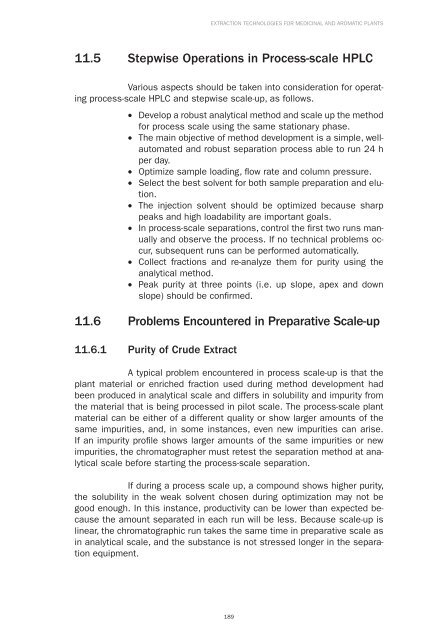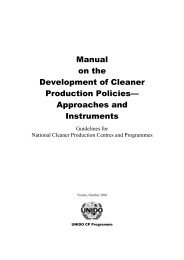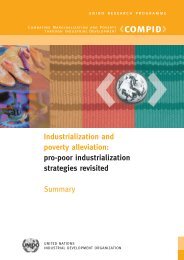Extraction Technologies For Medicinal And Aromatic Plants - Unido
Extraction Technologies For Medicinal And Aromatic Plants - Unido
Extraction Technologies For Medicinal And Aromatic Plants - Unido
You also want an ePaper? Increase the reach of your titles
YUMPU automatically turns print PDFs into web optimized ePapers that Google loves.
EXTRACTION TECHNOLOGIES FOR MEDICINAL AND AROMATIC PLANTS<br />
11.5 Stepwise Operations in Process-scale HPLC<br />
Various aspects should be taken into consideration for operating<br />
process-scale HPLC and stepwise scale-up, as follows.<br />
• Develop a robust analytical method and scale up the method<br />
for process scale using the same stationary phase.<br />
• The main objective of method development is a simple, wellautomated<br />
and robust separation process able to run 24 h<br />
per day.<br />
• Optimize sample loading, fl ow rate and column pressure.<br />
• Select the best solvent for both sample preparation and elution.<br />
• The injection solvent should be optimized because sharp<br />
peaks and high loadability are important goals.<br />
• In process-scale separations, control the fi rst two runs manually<br />
and observe the process. If no technical problems occur,<br />
subsequent runs can be performed automatically.<br />
• Collect fractions and re-analyze them for purity using the<br />
analytical method.<br />
• Peak purity at three points (i.e. up slope, apex and down<br />
slope) should be confi rmed.<br />
11.6 Problems Encountered in Preparative Scale-up<br />
11.6.1 Purity of Crude Extract<br />
A typical problem encountered in process scale-up is that the<br />
plant material or enriched fraction used during method development had<br />
been produced in analytical scale and differs in solubility and impurity from<br />
the material that is being processed in pilot scale. The process-scale plant<br />
material can be either of a different quality or show larger amounts of the<br />
same impurities, and, in some instances, even new impurities can arise.<br />
If an impurity profi le shows larger amounts of the same impurities or new<br />
impurities, the chromatographer must retest the separation method at analytical<br />
scale before starting the process-scale separation.<br />
If during a process scale up, a compound shows higher purity,<br />
the solubility in the weak solvent chosen during optimization may not be<br />
good enough. In this instance, productivity can be lower than expected because<br />
the amount separated in each run will be less. Because scale-up is<br />
linear, the chromatographic run takes the same time in preparative scale as<br />
in analytical scale, and the substance is not stressed longer in the separation<br />
equipment.<br />
189

















